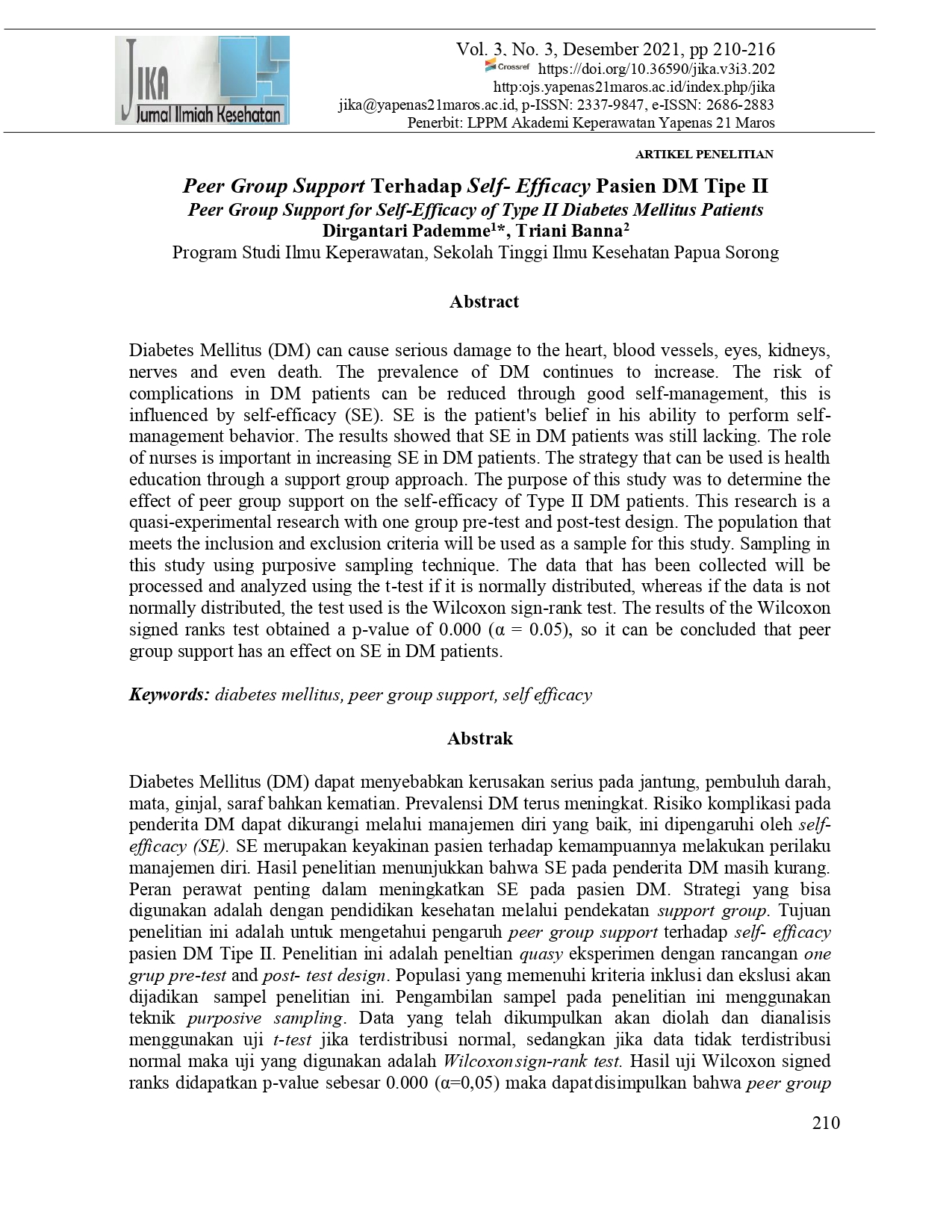Peer Group Support for Self-Efficacy of Type II Diabetes Mellitus Patients
DOI:
https://doi.org/10.36590/jika.v3i3.202Keywords:
diabetes mellitus, peer group support, self efficacyAbstract
Diabetes Mellitus (DM) can cause serious damage to the heart, blood vessels, eyes, kidneys, nerves and even death. The prevalence of DM continues to increase. The risk of complications in DM patients can be reduced through good self-management, this is influenced by self-efficacy (SE). SE is the patient's belief in his ability to perform self- management behavior. The results showed that SE in DM patients was still lacking. The role of nurses is important in increasing SE in DM patients. The strategy that can be used is health education through a support group approach. The purpose of this study was to determine the effect of peer group support on the self-efficacy of Type II DM patients. This research is a quasi-experimental research with one group pre-test and post-test design. The population that meets the inclusion and exclusion criteria will be used as a sample for this study. Sampling in this study using purposive sampling technique. The data that has been collected will be processed and analyzed using the t-test if it is normally distributed, whereas if the data is not normally distributed, the test used is the Wilcoxon sign-rank test. The results of the Wilcoxon signed ranks test obtained a p-value of 0.000 (? = 0.05), so it can be concluded that peer group support has an effect on SE in DM patients.
Downloads
References
Al-Khawaldeh OA, Al-Hassan ES, Froelicher. 2012. Self-efficacy, Self-management, and Glycemic Control in Adults With Type 2 Diabetes Mellitus. Journal of Diabetes and Its Complications. 26: 10-16.
American Diabetes Association. 2014. Executive summary : Standars of medical care in diabetes.
Amir H, Irwan AM, Saleh A. 2019. Gambaran Pelaksanaan Diskusi Refleksi Kasus (DRK) dalam Mendukung Peningkatan Pengetahuan dan Profesionalitas Perawat. Jurnal Keperawatan Muhammadiyah. 4(2).
Amir H, Sudarman, S. 2020. Reflective Case Discussion (RCD) for Nurses : A Systematic Review. STRADA Jurnal Ilmiah Kesehatan. 9(2):332-337. doi: 10.30994/sjik.v9i2.306.
Ariani Y. 2011. Hubungan Antara Motivasi dengan Efikasi Diri Pasien DM Tipe 2 Dalam Konteks Asuhan Keperawatan Di RSUP. H. Adam Malik Medan. [Tesis]. Depok: Fakultas Ilmu Keperawatan, Universitas Indonesia.
Diantiningsih Y, Bakar, A. 2012. Peer Group Support Terhadap Perubahan Kepatuhan Pengelolaan Penyakit Diabetes Mellitus Tipe 2. Surabaya: Program Studi Ilmu Keperawatan Universitas Airlangga. Skripsi.
Hunt WC, Wilder B, Steele MM, Grant SJ, Pryor RE, Moneyham L. 2012. Relationships Among Self-efficacy, Social support, Social problem solving, and Self-management in a Rural Sample Living With Type 2 Diabetes Mellitus. Research and Theory for Nursing Practice: an International Journal. 26(2).
Kong LN, Hu P, Yang L, Cui. 2018. The Effectiveness of Peer Support on Self-efficacy and Quality of Life in Adults With Type 2 Diabetes : A Systematic Review and Meta- analysis.
Lazuardi N. 2016. Pengaruh Intervensi Support Group terhadap Kualitas Hidup Pasien Penyakit Ginjal Kronis yang Mengjalani Hemodialisa. [Tesis]. Semarang: Program Studi Magister Keperawatan Universitas Diponegoro.
Lunenburg, C, Fred. 2011. Self-efficacy in the Workplace: Implications for Motivation and Performance. International Journal of Management, Business, and Administration. 14(1).
Patil SJ, Ruppar T, Koopman RJ, Lindbloom EJ, Elliott SG, Mehr, Conn VS. 2016. Peer Support Interventions for Adults With Diabetes: A Meta-Analysis of Hemoglobin A1c Outcomes. Ann Fam Med 14 (6):540-551.
Qi L, Liu Q, Qi X, Wu N, Tang W, Xiong H. 2015. Effectiveness of Peer Support for Improving Glycaemic Control in Patients With Type 2 Diabetes: A Meta-analysis of Randomized Controlled Trials. BMC Public Health 15(471).
Riskesdas. 2018. Riset Kesehatan Dasar. Jakarta: Badan Penelitian dan Pengembangan Kesehatan Kementerian Kesehatan RI.
Riskesdas. 2018. Riset Kesehatan Dasar dalam Angka Papua Barat. Jakarta: Badan Penelitian dan Pengembangan Kesehatan Kementerian Kesehatan RI.
Rustiani D. 2009. Hubungan Antara Dukungan Sosial dengan Derajat Depresi pada Penderita Diabetes Mellitus dengan Komplikasi. Skripsi. Surakarta. Fakultas Kedokteran Sebelas Maret.
Wang J, Shiu AT. 2003. Diabetes Self-efficacy and Self-care Behaviour of Chinese Patients Living in Shanghai. Journal of Clinical Nursing. 13:771–773.
WHO. 2016. Global report on diabetes. Geneva: WHO.

Downloads
Published
How to Cite
Issue
Section
License
Copyright (c) 2021 Dirgantari Pademme, Triani Banna

This work is licensed under a Creative Commons Attribution 4.0 International License.








